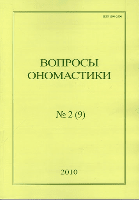
Voprosy Onomastiki-Problems of Onomastics
Scope & Guideline
Fostering Global Discourse in Onomastic Studies
Introduction
Aims and Scopes
- Toponymy and Historical Context:
Research on place names (toponyms) that explores their historical significance, etymology, and cultural implications, often tied to specific geographical regions. - Anthroponymy and Personal Naming:
Studies centered on personal names (anthroponyms), examining their formation, usage, and socio-cultural roles, including nicknames and their evolution over time. - Sociolinguistics and Naming Practices:
Investigations into the social aspects of naming, including how names reflect and influence identity, community dynamics, and cultural heritage. - Comparative Onomastics:
Comparative studies that analyze naming conventions across different cultures and languages, highlighting similarities and differences in onomastic traditions. - Cognitive and Pragmatic Perspectives:
Exploration of the cognitive aspects of naming and the pragmatic functions of names in communication, including metaphorical uses and sound symbolism. - Toponymic Landscapes and Identity:
Research examining how place names contribute to regional identities and community narratives, often through case studies of specific areas.
Trending and Emerging
- Sociolinguistics of Naming:
There is a growing trend towards understanding how social factors influence naming practices, especially in multilingual and multicultural contexts, reflecting contemporary societal changes. - Digital Onomastics:
Emerging interest in the digital representation and analysis of names, facilitated by technological advancements and the availability of online databases and resources. - Interdisciplinary Approaches:
An increasing number of studies are adopting interdisciplinary methodologies, integrating insights from anthropology, sociology, and cognitive science to enrich onomastic research. - Cultural Identity and Naming:
A rising focus on how names contribute to cultural identity and heritage, particularly in the context of diaspora communities and cultural preservation. - Sound Symbolism and Hypocorisms:
Research into sound symbolism and the use of hypocoristic forms in various languages is gaining traction, indicating an interest in the phonetic aspects of naming.
Declining or Waning
- Historical Linguistics:
There has been a noticeable decrease in papers specifically addressing historical linguistics within the onomastic context, suggesting a shift towards more contemporary or applied studies. - Mythological and Folkloric Names:
The exploration of names derived from mythology and folklore, once a prominent theme, appears to be less frequent in recent issues, possibly overshadowed by more empirical studies. - Geographical Naming Conventions:
Research specifically focused on geographical naming conventions has waned, indicating a possible shift towards more sociolinguistic or identity-focused studies. - Etymological Studies:
While still relevant, dedicated etymological studies of names have become less pronounced, with more emphasis now placed on broader sociocultural analyses rather than strictly linguistic origins.
Similar Journals
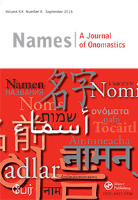
Names-A Journal of Onomastics
Pioneering Research in the Study of NamesNames: A Journal of Onomastics, published by the University of Pittsburgh, University Library System, is a premier platform for scholars and practitioners in the fields of onomastics, linguistics, and demography. With an impactful open-access approach since 2021, this journal fosters greater accessibility to high-quality research and discourse in the critical study of names and their implications across cultures and societies. Celebrated for its rigorous scholarly contributions, Names has earned notable rankings, including Q1 in Linguistics and Language and Q2 in Demography for 2023, signaling its importance in shaping contemporary research dialogues. Covering a wide scope from 1953 to 2024, it provides a vital resource for researchers, professionals, and students alike, dedicated to advancing knowledge and promoting interdisciplinary dialogues within these dynamic fields.

Philologica Canariensia
Illuminating the vibrant fields of literature and language.Philologica Canariensia is a distinguished academic journal published by the University of Las Palmas de Gran Canaria, focusing on the vibrant fields of Literature and Literary Theory as well as Linguistics and Language. With an impact factor that positions it in the Q1 and Q2 quartiles in its respective categories as of 2023, the journal has established itself as an important platform for scholarly communication and research. Since transitioning to Open Access in 2014, it has broadened its reach, allowing researchers, professionals, and students from around the globe to access high-quality publications without barriers. With a commendable presence in Scopus rankings, including a rank of #309 out of 1106 in Literature and Literary Theory, Philologica Canariensia aims to foster an interdisciplinary dialogue and advance knowledge in the humanities. The journal's commitment to publishing innovative research makes it an essential resource for anyone engaged in exploring linguistic and literary phenomena.
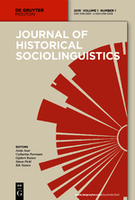
Journal of Historical Sociolinguistics
Bridging History and Sociolinguistics for Future InsightsThe Journal of Historical Sociolinguistics is a distinguished publication focusing on the intricate relationships between language and society from a historical perspective. Published by WALTER DE GRUYTER GMBH in Germany, this journal (ISSN: 2199-2894, E-ISSN: 2199-2908) is recognized for its rigorous scholarship, ranking in the Q2 quartile in Linguistics and Language (2023), highlighting its relevance and impact within the academic community. With Scopus rankings placing it at #326/1088 in Arts and Humanities and #386/1167 in Social Sciences, this journal is essential for researchers and scholars interested in the dynamics of language evolution, sociolinguistic shifts, and historical context. Through its insightful articles and contributions, the journal aims to illuminate the nuanced interplay between linguistic change and social factors over time, making it an invaluable resource for students, professionals, and academics alike. The journal operates under an open-access model, ensuring that knowledge is disseminated widely and freely accessible to those engaged in the cutting-edge studies of sociolinguistics.
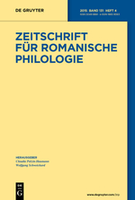
ZEITSCHRIFT FUR ROMANISCHE PHILOLOGIE
Exploring the Rich Tapestry of Romance Languages and LiteratureZEITSCHRIFT FUR ROMANISCHE PHILOLOGIE, published by Walter de Gruyter GmbH, stands as a prominent peer-reviewed journal dedicated to the fields of Linguistics, Literature, and Literary Theory. Established in 1877 and continuing its legacy to the present day, this esteemed journal offers a platform for comprehensive scholarship that explores the intricacies of Romance languages and their literary heritage. With a notable Q1 ranking in Literature and Literary Theory and a Q2 ranking in Linguistics and Language, it has secured its place among leading resources in the humanities. Researchers, educators, and students benefit from its rich historical context and current contributions to the understanding of Romance languages and literature. Though currently not available as Open Access, the journal prioritizes the dissemination of high-quality research, making significant strides in fostering academic dialogue and advancement. Its address at Genthiner Straße 13, Berlin, Germany, situates it in a hub of scholarly activity, bridging the past with contemporary literary discourse.

REVUE DE LINGUISTIQUE ROMANE
Connecting Cultures Through Linguistic InsightsREVUE DE LINGUISTIQUE ROMANE, published by the esteemed SOCIÉTÉ LINGUISTIQUE ROMANE, is a prominent academic journal dedicated to the exploration of Romance linguistics. With its ISSN 0035-1458, the journal plays a significant role in advancing knowledge within the fields of linguistics and the history and philosophy of science. Although it does not currently offer Open Access, it provides critical insights and peer-reviewed research that are indispensable for scholars, educators, and students interested in the nuances of Romance languages. The journal, which has seen converged coverage from 2006 to 2017, and then again from 2019 to 2021, is ranked in the third quartile (Q3) across various categories within Scopus, reflecting its established presence in the academic community. As a vital resource for interdisciplinary studies, REVUE DE LINGUISTIQUE ROMANE is instrumental for those seeking to deepen their understanding of linguistic structures, cultural nuances, and the historical development of Romance languages.

Journal of Greek Linguistics
Connecting Language, Culture, and Society in Greek StudiesThe Journal of Greek Linguistics, published by BRILL, is a premier platform dedicated to advancing the study of Greek language and its historical and contemporary implications within the broader field of linguistics. With an impact factor recognized in the linguistics community, this journal significantly contributes to the academic discourse surrounding Greek linguistics and its relevance in cultural and social studies. First made open access in 2016, it is now accessible to a global audience, facilitating a collaborative environment for researchers, scholars, professionals, and students alike. The journal is proudly positioned in the Q2 quartile for linguistics and language, reflecting its esteemed standing in the academic community, and it ranks within the top 30% in both the Arts and Humanities and Social Sciences categories according to Scopus. With a focus on the intersection of language, culture, and society, the journal invites contributions that offer new insights and promote interdisciplinary research. The Journal of Greek Linguistics continues to be an essential resource for those engaged in the rich and evolving conversation about the Greek language.

Langages
Connecting Global Voices Through Linguistic ResearchLangages is a premier peer-reviewed journal in the field of linguistics, published by Armand Colin, a reputable French publisher known for its commitment to advancing academic scholarship. With an ISSN of 0458-726X and an E-ISSN of 1958-9549, this journal has been an important platform for linguistic research since its inception in 1976, and it continues to engage with contemporary linguistic debates through to 2024. The journal is ranked in the top two quartiles for linguistics and language, reflecting its significance in the academic community, with a Q2 categorization in 2023, and robust Scopus rankings within the 66th to 69th percentiles across relevant categories. Authors and researchers from around the globe contribute to its rich tapestry of scholarly articles that explore the multifaceted nature of language and its role in society, making Langages an essential resource for linguists, educators, and students alike.

Fontes Linguae Vasconum
Exploring the Depths of Language HeritageFontes Linguae Vasconum, published by GOV NAVARRA, DEPT CULT SPORT & YOUTH DIR GENERAL CULT-INST PRIN VIANA, stands as a pivotal academic resource in the field of Linguistics and Language studies. Established as an Open Access journal since 2007, it ensures wide dissemination of research findings and promotes collaborative dialogue among scholars, researchers, and students. With a growing impact factor reflected in its Q2 category ranking in Linguistics and Language for the year 2023 and an impressive standing in Scopus with a rank of #443 in Arts and Humanities, the journal serves as a significant platform for advancing knowledge derived from the rich linguistic heritage of the Basque language and beyond. The journal is dedicated to publishing high-quality research articles, reviews, and discussion pieces that explore diverse aspects of language, fostering connections between contemporary linguistic theories and their practical implications. Based in Pamplona, Navarra, Spain, Fontes Linguae Vasconum continues to evolve, providing researchers and academics with essential insights and a valuable reference in the vibrant field of linguistics.
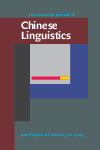
International Journal of Chinese Linguistics
Pioneering Studies in Chinese LinguisticsInternational Journal of Chinese Linguistics is a distinguished publication that delves into various aspects of linguistic studies pertaining to the Chinese language. Published by John Benjamins Publishing Co, this journal stands out for its commitment to advancing the knowledge and understanding of Chinese linguistics within the global academic community. With an impact factor that places it in the Q2 quartile of linguistics and language, the journal is indexed in prominent databases, achieving ranks of #501 in Arts and Humanities and #580 in Social Sciences. These rankings reflect the journal's dedication to maintaining high scholarly standards and its relevance in both linguistic research and practical applications. While not categorized as Open Access, the journal provides necessary access through institutional subscriptions, thereby ensuring that valuable research reaches a broad audience. Covering a wide range of topics from syntax and phonetics to sociolinguistics and applied linguistics, the International Journal of Chinese Linguistics serves as an essential resource for researchers, professionals, and students seeking to deepen their understanding of the intricate relationship between language and culture in the Chinese context. With converging years from 2019 to 2024, it continues to evolve, reflecting ongoing developments in the field.

Emakeele Seltsi Aastaraamat-The Yearbook of the Estonian Mother Tongue Society
Fostering Dialogue in Estonian Language StudiesEmakeele Seltsi Aastaraamat - The Yearbook of the Estonian Mother Tongue Society is a distinguished annual journal published by Estonian Academic Publishers. Recognized in the field of Linguistics and Language, it holds a notable position with a Q3 ranking in the 2023 category quartiles and is placed in the 64th percentile among arts and humanities publications. The journal serves as an important platform for scholarly articles that explore contemporary issues in the Estonian language, fostering academic discourse and promoting research initiatives among linguists, educators, and students. Spanning from 2011 to 2017, and from 2019 to 2024, it continues to contribute valuable insights into linguistic culture, education, and preservation. Although there are no open access options, the journal offers in-depth studies that enrich understanding and appreciation of the Estonian language and its context, making it a must-read for anyone invested in linguistic scholarship.